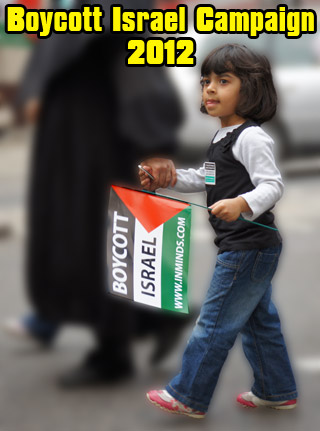
 Innovative Minds © 2014. All Rights Reserved. www.inminds.co.uk | |||||
Norman Finkelstein & Jonathan Rosenhead on BDSinminds 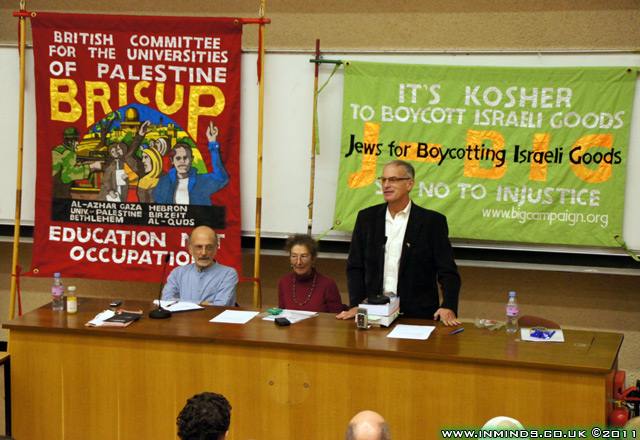 Professor Jonathan Rosenhead, Naomi Wimborne-Idrissi, and Professor Norman Finkelstein (left-to-right) On Friday 11th November 2011, at University College London, renowned political analyst and activist Professor Norman Finkelstein and Professor Jonathan Rosenhead, chair of the British Committee for the Universities of Palestine (BRICUP) discussed Boycott, Divestment and Sanctions (BDS). It was part of Norman Finkelstein speaking tour of the UK which was organised by the Palestinian Return Centre and Jews for Boycotting Israeli Goods (JBIG). Unlike all his other packed venues on the tour, sometimes with over a 1000 people, the audience here was much smaller and consisted of activists. This lead to greater debate and interesting two-way discussions. Naomi Wimborne-Idrissi of JBIG chaired the event. 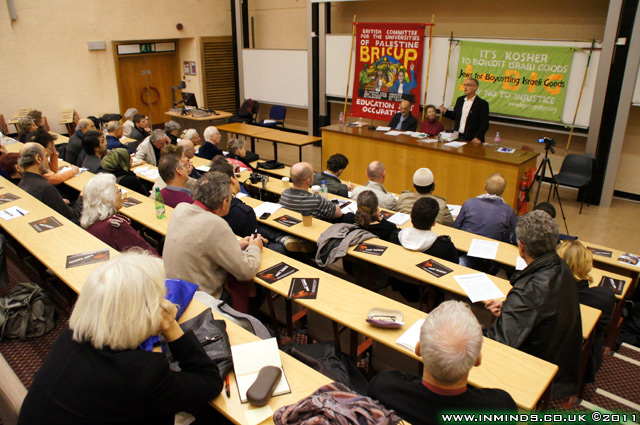 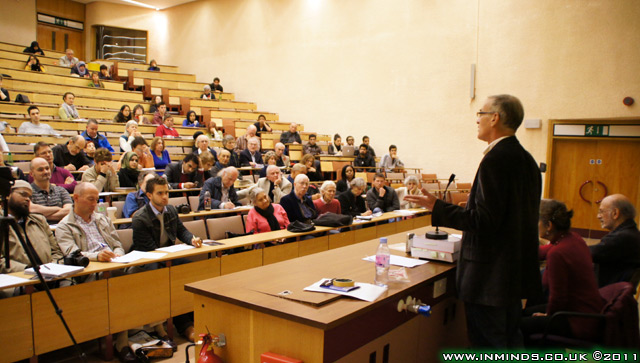 The proposal under discussion was: The Palestinians having being denied justice for 63 years, those who support their rights must endorse their call for Boycott, Divestment and Sanctions (BDS), including academic and cultural boycott of Israel.
Each speaker spoke for 20 minutes, this was followed by 45 minutes of open discussion with the audience and ending with 10 minutes closing response by each speaker. The full video is provided below: Professor Jonathan RosenheadProfessor Jonathan Rosenhead is chair of the British Committee for the Universities of Palestine (BRICUP) which is the main organisation in the UK supporting the academic and cultural boycotts of Israel, it parallels PACBI in Palestine. Professor Rosenhead is also an activist, taking part in the flotilla, sailing to Gaza to break the Israeli seige. 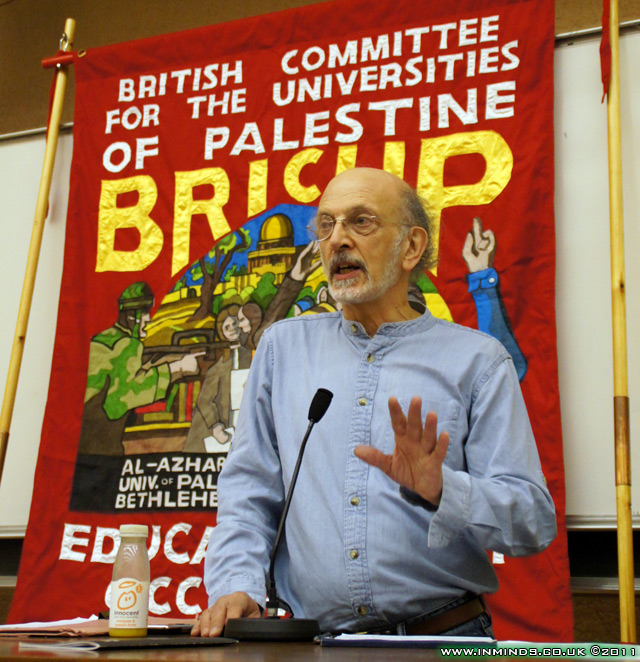 Professor Jonathan Rosenhead Jonathan Rosenhead gave a good introduction of what a boycott is, and particularly useful, an analysis of the boycott of South African during apartheid and how it compares to the current BDS campaign against Israel: Boycott - basically its a tool of the weak, who individually are weak but collectively can have some strength against overweening power. The first use of the word was a combination of tenant farmers in Ireland against their land agent, famous cases are the Montgomery Bus boycott and little more recently the sporting boycott and other boycotts against South Africa.
There are difference between all these boycotts, and I would stress that by taking the archetypal case of that of the tenant farmers who resisted the land agent Charles Boycott, who gave his name to the whole process, in the 1880s in Ireland. Boycott was the land agent for an absentee English noble. And what they did, when he became too domineering, is they denied him labour to save the harvest, they put him into isolation - refused to talk to him under any circumstances, they shops wouldn't serve him, the workers wouldn't go and look after his house for him, and the person wouldn't deliver him letters. And in reasonably short order, by the end of the year Boycott had been forced out and returned to England. So very direct. 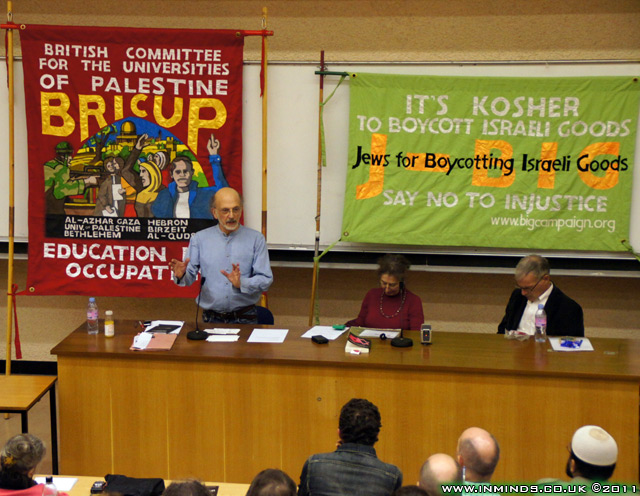 Professor Jonathan Rosenhead The South African sporting boycott was nothing like that. Sport does not have that effect on anyone, making is impossible for them to function, thought the lack of sport. The South African population was in any case waging its own struggle, including the armed struggle. The sports and other boycotts were about how outsiders could help that internal struggle, how world civil society could get its act together and show their support. If they could demonstrate their support its very encouraging to those who are locked in an uneven struggle internally, the oppressors feel the wind of disapproval, the outrage of apartheid was embedded in the daily activities of us as protesters so we were continually reminded every time we didn't buy an Outspan orange why we weren't doing it.
The boycott became a focus for recruitment and for education, people were made to think of why it was that the boycott was going on. And of course there were direct psychological and economic effects on South Africa as the target. But those economic effects, the direct economic effects of the sporting and other boycotts was not what brought South Africa down. The sporting boycott is the one that's mostly remembered, because its so dramatic as it hit the South African 'whites' in a significant aspect of their identity. You'll notice that the sporting boycott of Israel is not so prominent, it would be a bit like breaking a butterfly in a wheel. But it wasn't only a sporting boycott of South Africa, there was an academic boycott - actually it was rather more fierce than the one against Israel, more tightly drawn. Then there was a cultural boycott, a consumer boycott. And all these boycotts combined did not bring the South African apartheid regime down with all its military might and its nuclear weapons - shades of Israel, same kind of overwhelming force. But these boycotts did contribute in an indirect way, started the motor of change which eventually did force the end of apartheid. They changed the climate of world opinion. South Africa became a pariah state, investors and financiers began to feel this was not the place to put their money and the South African economy began to wind down. Finally national government began to say that financiers were already effectively involved in divestment now we as national governments will find it safer and appropriate to bring sanctions against South Africa and at that point, but largely due to the economic disruption that was taking place, the apartheid regime negotiated its own demise. Now its not necessarily the case that that's what will happen in Israel / Palestine, but you can be sure it will happen, we just don't know the mechanism by which it will happen or the significance of the boycott in that process but do know it's what we can do from here, and it does look from the sensitivity of the Israelis as if its a pretty good tactic. In the South African case it was a long and tortuous path going from the start of the boycott in the 1960s to the end of the apartheid regime in the early 1990s. It was initiated by people like you and me, it wasn't initiated by governments or corporations. the boycott of Israel, I think we can say, still has some way to go. Started of with the academic boycott in 2004 and the general call in 2005. But already we see for example the Norwegian National Pension Fund has withdrawn Israeli stock holdings from its portfolio, it has divested. So that has moved much faster than it happened in the South African case, the train of the boycott is moving and its picking up speed. 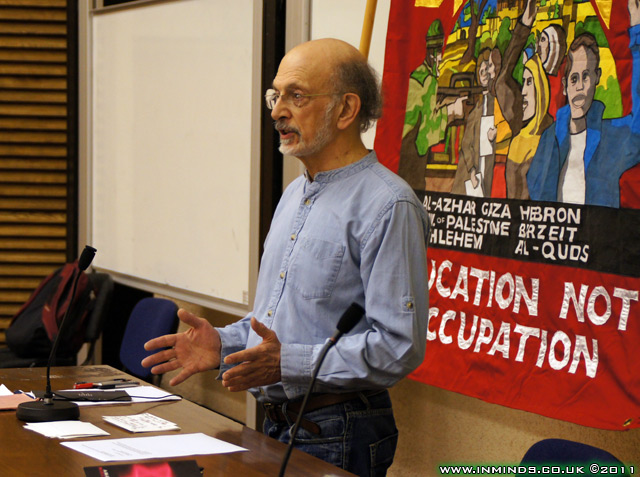 Professor Jonathan Rosenhead
The academic and cultural boycott are institutional, they were not targeting particular or any Israeli artists, film makers or academics unless they represent deeply compromised institutions in their country. In their role as representing Israeli institutions they may be boycotted, in their role as simply artists or academics they will not. So there is no move as their was in the South African case to say no Israeli academic must come to an academic conference, what we do say is that we will not go to academic conferences in Israel, we wont referee people applications for promotion or for appointments in Israel, we wont get in to joint projects which are housed in an Israeli university.
He then gave the example of the recent case of the Israeli Philharmonic Orchestra which came to the UK: It was targeted not at the individual orchestra members, but at the orchestra itself which is a major cultural institution of Israel. It proclaims on its website that's its proud to be a cultural ambassador for Israel, it boasts of its services to the Israeli defence forces - going and performing at various units and so on. So they became by their own choice a representative of the Israeli government and as such they were targeted.
Professor Norman FinkelsteinProfessor Norman Finkelstein is a renowned analyst of the Israel-Palestine conflict. He is well known for his seminal work on the "Holocaust Industry" (how Israel has callously used the genocide of the Jews in furthering its zionist cause), and for his demolition of Dershowitz's "case for Israel" and with it Dershowitz reputation as an academic. Such accomplishments have not gone unnoticed and he is constantly in the cross-hairs of the guns of the Israel lobby and has made great personal sacrifices for his stance against Israel. He commands the respect of all pro-justice activists. 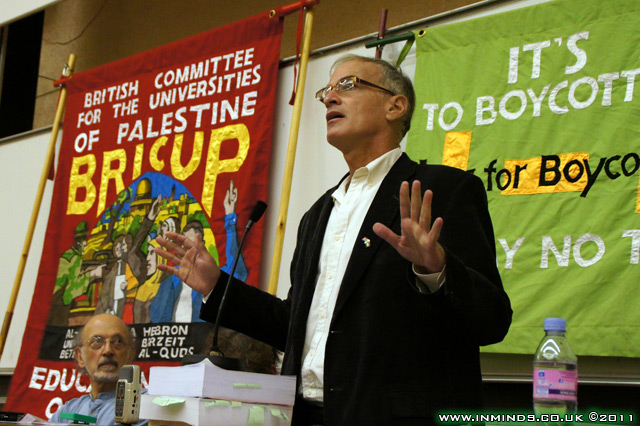 Norman Finkelstein Norman Finkelstein whilst clearly stating that "I support the BDS campaign" had certain reservation of all the focus being placed on BDS: BDS is one tactic, its not THE tactic as some exponents of BDS would like us to believe. Its one of broadly speaking three tactics.
One, which had some salience in the UK in particular is what you might call the legal strategy, its peak came with the issuance of the Goldstone Report and the attempts around the Goldstone Report to utilise the provision in international law for Universal Jurisdiction to hold Israelis accountable. That to me was a very promising tactic, obviously as everyone know extreme constraints have been imposed on it in the UK, but it was a promising tactic, it was a useful tactic. Its not BDS, it was a seperate tactic which has its own, in my opinion, moral authority and political authority. Then there is the second tactic - various forms of non-violent action. If the Goldstone Report was the pinnacle of the legal strategy then the pinnacle of the non-violent civil disobedience tactic was the flotillas, most notably the Mavi Mara. Note this is a seperate tactic that's not BDS. So you could say that BDS is one of three broad strategies that's been attempted. All of them have registered some success, none of them has been resoundingly successful. All of them have registered some successes and significant setbacks. So at this point I would say its premature to label any strategy as THE strategy and I do find it troubling that say when I come to the UK there is a session specially allocated to BDS and there are no other sessions allocated to other strategies. And that to me again is an indication of a creation of a cult which worries me. 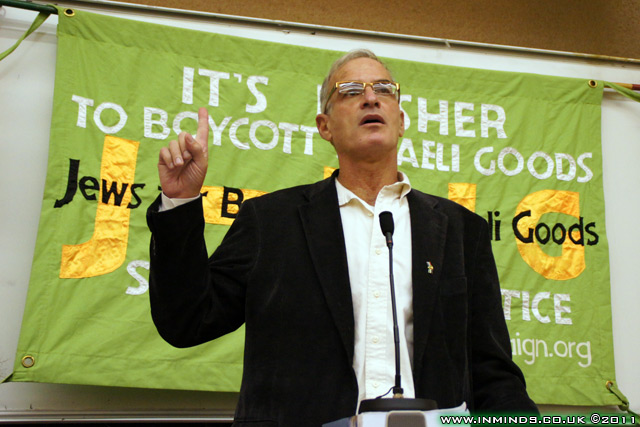 Professor Norman Finkelstein He said that whilst BDS has great appeal.. ..you couldn't find a more morally unimpeachable tactic [BDS] - its non-violent, it doesn't use any forms of force, even force of language, the tactic itself is unimpeachable but it has to be attached to a goal that will reach the public, now it you attach it to a goal that does not reach the public its a dead end.
He proposed the goal of BDS should be seeped in the law.. 'Okay we'll boycott, but till when? Till the Palestinians say stop. Is that going to convince anyone? In my opinion rightfully it shouldn't convince people. There is a standard we should use, a standard which I think is effective, a goal which I think can work, and the goals is we want to uphold the law. There are a whole series of international resolutions, legal findings, we want to implement the law..
Many were confused at this point as the demands of the BDS call has always been founded on international law. From the July 2005 Palestinian Civil Society Call for BDS:We, representatives of Palestinian civil society, call upon international civil society organizations and people of conscience all over the world to impose broad boycotts and implement divestment initiatives against Israel similar to those applied to South Africa in the apartheid era. We appeal to you to pressure your respective states to impose embargoes and sanctions against Israel. We also invite conscientious Israelis to support this Call, for the sake of justice and genuine peace. These non-violent punitive measures should be maintained until Israel meets its obligation to recognize the Palestinian peopleâs inalienable right to self-determination and fully complies with the precepts of international law by: 1. Ending its occupation and colonization of all Arab lands and dismantling the Wall Endorsed by: The Palestinian political parties, unions, associations, coalitions and organizations below represent the three integral parts of the people of Palestine: Palestinian refugees, Palestinians under occupation and Palestinian citizens of Israel. src: http://www.bdsmovement.net/call The resulting contovery is covered in Naomi Foyles article reproduced with permission below. Norman Finkelstein's fixation with a bantustan solution for Palestine which like South Africa's bantusans packs Palestinians into a mere 18% of their land and hands the rest over to Zionist colonists to continue their racist apartheid project in has been covered previously by ourselves here and more recently in Tony Greenstein's article here. 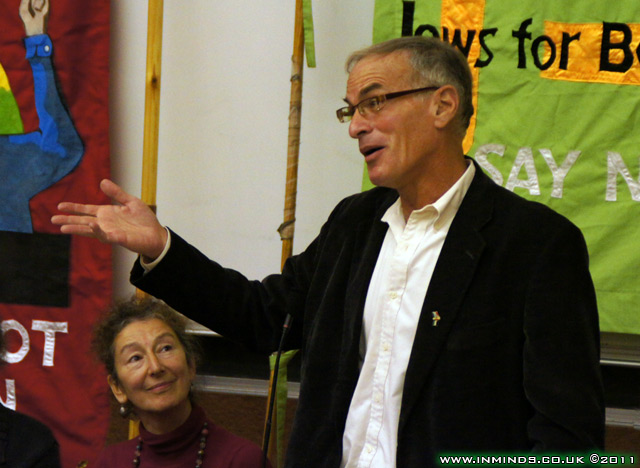 Professor Norman Finkelstein fielding questions For any objective observer of the struggles against apartheid in South Africa and in Palestine, its bewildering to see the double standards, even amongst many activists campaigning for Palestine. During the boycott of South Africa no one in the solidarity movement questioned the academic, cultural, sporting or consumer boycotts and they were enforced far more vigorously than that against Israel. The bantusan solution, where blacks would be rounded up and packed into so-called homelands leaving a racist apartheid state intact in the rest of South Africa, as promoted by the apartheid regime and its quislings, was never accepted. Any outcome which left intact a racist apartheid state was rejected on principle. Yet in the case of Israel those principles seem to have vanished, and a bantusan solution which leaves a zionist racist state intact in 82% of Palestine is hailed as a goal to aim for, and the reasoning given is that we have to be realistic, the oppressor will not accept a one state solution so we shouldn't strive for it! Also no one in the solidarity movement questioned the use of violence by the oppressed blacks who faced the bullets and torture of the ruthless apartheid regime in South Africa, yet Palestinians who face far greater violence - f-16 fighter jets, phosphorous bombs, and tanks, are criticised and even condemned for their armed resistance. When the South African apartheid regime wanted to assassinate Ruth First, ANC founding member and wife of Joe Slovo, the leader of the military wing of the ANC, they used a letter bomb. When the Zionist regime wanted to assassinate Salah Shehade, head of the military wing of Hamas, they dropped a 1 ton bomb on the three story apartment block his family lived in, killing 14 people including 8 children. It is in this context, when considering the oppressors disproportionate use of violence, that armed resistance can be understood. It is the right of the oppressed to choose the means and mechanisms for their liberation, we living in the West who through are taxes and elected governments contribute to their oppression have no right to demand what form their resistance should take. Our job is here in the West, to cut the support our governments, corporations, and institutions are providing in our name to sustain the occupation. 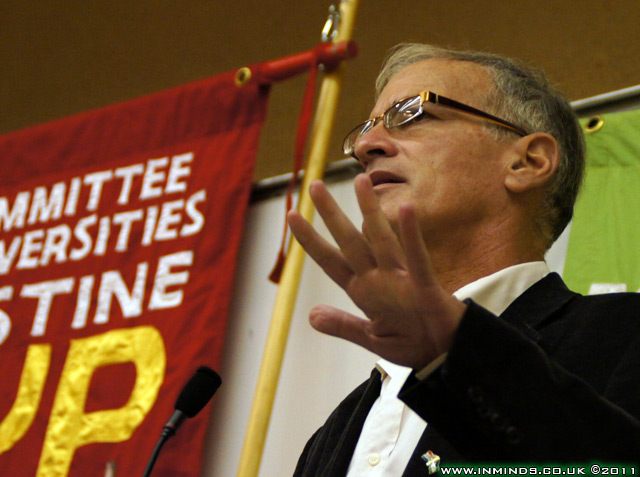 Full Video: Norman Finkelstein & Jonathan Rosenhead on BDS
Norman Finkelstein: Playing Jenga with the Struggle?By Naomi Foyle On Friday Nov 11 2011, at UCL, world-renowned scholar and activist for Palestinian rights Prof Norman Finkelstein appeared in conversation with Prof Jonathan Rosenhead of BRICUP (British Committee for the Universities of Palestine), discussing the proposition: The Palestinians having being denied justice for 63 years, those who support their rights must endorse their call for Boycott, Divestment and Sanctions (BDS), including academic and cultural boycott of Israel. Prof Finkelstein also gave a public lecture in the evening, which unfortunately I could not attend. Following is my report on the afternoon conversation, which turned into a debate. I wonât give a blow-by-blow account of the discussion, which was videoed and presumably will soon be available online. Rather I will just summarise here the main disagreement between the speakers, and give my reaction to it. 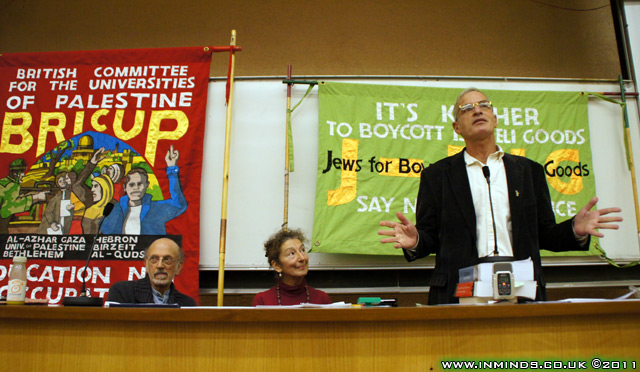 Professor Jonathan Rosenhead, Naomi Wimborne-Idrissi, and Professor Norman Finkelstein (left-to-right) Jonathan Rosenhead opened with a clear historical overview of boycott as a strategy, and ended by saying that in the case of Palestine, it should continue until the Palestinians ask us to stop supporting it â that is, until the system of oppression they suffer under has ended. Norman Finkelstein responded by arguing forcefully that the Boycott Divestment Sanctions campaign should work toward goals based in International Law, not some vague, impossible to define, outcome; and that we shouldnât feel obliged to follow the Palestiniansâ lead, as previously this would have obliged us to support suicide bombing. He said much else, including giving a review of the state of International Law on Palestine, and the helpful advice to cite this more in our literature, but I want to focus on this essential point of discord. Frankly I was very surprised to hear Prof Finkelsteinâs criticism of BDS. I, and others, spoke from the floor, reminding both speakers that the demands of the BDS movement, as stated by PACBI, are clearly based on International Law: [that] Israel withdraws from all the lands occupied in 1967, including East Jerusalem; removes all its colonies in those lands; agrees to United Nations resolutions relevant to the restitution of Palestinian refugees rights; and dismantles its system of apartheid. Prof Finkelstein responded by saying that while the first three demands are sound in law, the last, the demand for Israel to dismantle its system of apartheid, is not, because Israeli apartheid hasnât been recognised by the UN or other bodies of International Law. He claimed that without this legal underpinning, the goal of ending apartheid in Israel is counter-productive â that it âturns people offâ; that BDS will never become a mass movement if we try to get people to sign up to tampering with the state of Israel itself. I also tried to discuss this with him afterwards. I asked him why, if the situation in Israel fits the UN definition of apartheid, we shouldnât work toward getting iron-clad legal recognition of this fact. But Prof Finkelstein rejected this approach, saying â that would take 100 yearsâ. 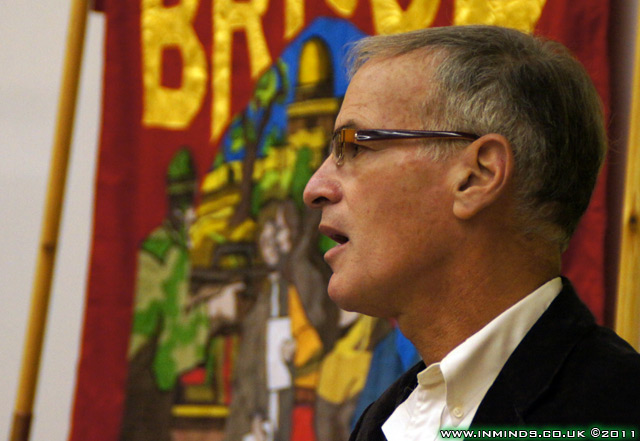 Underlying Prof Finkelsteinâs hostility to this key plank of the BDS movement appears to be the fear that the demand to end Israeli apartheid is a disguised call to âend the state of Israelâ, rather than ending the way the state is currently organised, which is how all the people I know interpret the demand. After all, South Africa still exists as a state. Personally, I think Prof Finkelstein is sadly out of touch with the robust health and rapid growth of the BDS movement. Far from being a threat to building a mass movement, the demand to end Israeli apartheid is one that everyone can understand â every ordinary person on the streets of the UK knows what South Africa was like; all they need is some basic education about Palestine to see that apartheid is operating there as well. Especially considering that the South Africans themselves are taking such leadership in BDS, and separate campaigns to End Israeli Apartheid are evident all over the internet, itâs a nonsense to say that the demand is unrealistic. On the legal front, the very recent Russell Tribunal on Palestine Capetown Session has recommended (among other pertinent goals): The UN General Assembly to reconstitute the UN Special Committee against Apartheid, and to convene a special session to consider the question of apartheid against the Palestinian people. In this connection the Committee should compile a list of individuals, organisations, banks, companies, corporations, charities, and any other private or public bodies which assist Israelâs apartheid regime with a view to taking appropriate measures. 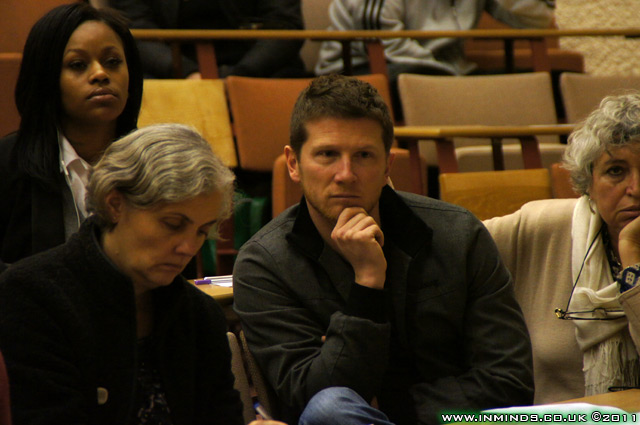 Frank Barat, Coordinator of the Russell Tribunal on Palestine In my view, the current BDS strategy is right on target, and I wish Prof Finkelstein would put his considerable legal chops in the service of the goals of the Russell Tribunal. I also wish to respond to his second criticism of the BDS movement â that it takes its leadership from the Palestinians. To deal first with his counter-example â in my view, the BDS movement is not at all comparable to the suicide bombing campaigns, which made no formal call for international support, and were never, to my knowledge, endorsed by any UK solidarity group. Rather, solidarity works to provide and support democratic alternatives to such desperate, tragic, violent and, indeed, as Prof Rosenhead stated, politically counter-productive measures. The Palestinians themselves have turned en masse away from suicide bombing as a strategy â as comedian and âextreme ramblerâ Mark Thomas recently recounted in his recent Walking the Wall tour, countless Palestinians get through holes in the wall daily, not to bomb civilians, but in order to work illegally in Israel. Instead, Palestinian civil society has overwhelmingly endorsed BDS, and taking our leadership from them is an essential part of the moral legitimacy of the campaign. First, if BDS was just a matter of personal conscience, then indeed I would be a hypocrite for spending so much time promoting the boycott of Israel and not other countries with terrible human rights records. Second, as I have stated before, it is not up to us in the West to dictate to the Palestinians how they should run their campaigns. Instead, we can choose which campaigns we want to support, and then do so wholeheartedly, and in a spirit of solidarity, dialogue and willingness to learn. I donât believe in capital punishment for any crime, and would never endorse any kind of violence that was not clearly in self-defense, in the strictest sense of the term. But as I have argued before on this blog, Palestinian violence must be seen in the context of 62 years of oppression, and ending that systematic injustice, in a way that is 100% consistent with the principle of Palestinian self-determination, is the only way to end that violence. By criticizing this key demand of the BDS movement, and dismissing the paramount importance of the need to work in solidarity with the Palestinians, Prof Finkelstein is playing Jenga with the Palestinian struggle â poking and pulling away the foundational planks of its existence. We donât need that at this time. We need an atmosphere of mutual support and co-operation between the legal, civil disobedience, and BDS strategies. I thank Prof Finkelstein for his very useful summary of the legal position of the Palestinian cause and Prof Rosenhead for his profound commitment to the principle of solidarity, and I place these thoughts on record in hope that they may contribute to a spirit of unity in the popular movement for Palestinian human rights.
src: http://bwisp.wordpress.com/2011/11/12/norman-finkelstein-playing-jenga-with-the-struggle
Source: www.inminds.co.uk Related Articles
Also Of InterestPage URL: http://inminds.com/article.php?id=10526
|
|
Support Us
If you agree with our work then please support us.Campaigns INMINDS Facebook Live Feed Latest Video's
INMINDS Twitter Feed Tweets by @InmindsComFeatured Video's
You need Flash player 8+ and JavaScript enabled to view this video.
[all videos (over 200)..] Featured MP3 Podcast 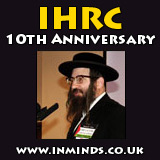 "Unfortunately the zionists have control of the media throughout the world, they have usurped our name, the star of David, everything, all our symbols, the name - the Jewish state they call it, everything they have taken, and we have very little power to be able to speak up. We have God - that's the greatest power.." Neturei Karta, Jews against Zionism Islamic Human Rights Commission 10th Anniv. Nov 2007 [16min / 7Mb] [all podcasts..] Newsletter Feedback |
 |
 |

























